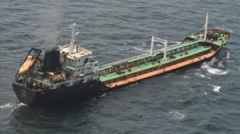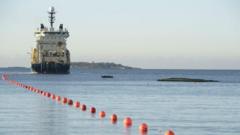
Russia has been supplying North Korea with over a million barrels of oil since March 2024, according to satellite imagery analysis by the Open Source Centre. This oil transfer is believed to be payment for weapons and troops that North Korea has sent to support Russia’s war in Ukraine.
The oil shipments violate UN sanctions, which restrict North Korea to 500,000 barrels of refined petroleum annually. Satellite images reveal more than a dozen North Korean oil tankers making 43 trips to a Russian oil terminal in the Far East. The tankers typically arrive empty and leave almost full, with researchers estimating they are loaded to 90% capacity.
For North Korea, this oil supply is crucial. While most citizens rely on coal, oil is essential for military operations, including transporting missile launchers, running munitions factories, and fueling elite vehicles. Previously, the country was forced to acquire oil illicitly through risky and expensive maritime transfers.
Joe Byrne from the Open Source Centre describes the arrangement as a mutual lifeline: “While Kim Jong Un is providing Vladimir Putin with a lifeline to continue his war, Russia is quietly providing North Korea with a lifeline of its own.” The tankers have been making these transfers with their trackers switched off, attempting to conceal their movements.
The oil transfers are part of a broader strategic partnership between Russia and North Korea. The US and South Korea estimate that Pyongyang has already sent Moscow 16,000 shipping containers of artillery shells and rockets. Additionally, Putin and Kim have signed a defense pact, resulting in thousands of North Korean troops being deployed to Russia’s Kursk region.
Experts are particularly concerned about potential future technology exchanges. South Korea fears Russia might provide North Korea with advanced technology for spy satellites and ballistic missiles. As Andrei Lankov, a North Korea-Russia relations expert, notes, “The Russians need these troops, and this gives the North Koreans more leverage.”
The situation has drawn international condemnation. UK Foreign Secretary David Lammy stated that Russia’s reliance on North Korea for troops and weapons is “having a direct impact on security in the Korean peninsula, Europe and Indo-Pacific.”
Notably, Russia recently disbanded the UN panel responsible for monitoring sanctions violations, using its UN Security Council veto. Eric Penton-Voak, a former panel member, argues this shows “a new level of contempt for these sanctions” and represents a dangerous trend of autocratic regimes supporting each other while ignoring international community wishes.
The Open Source Centre calculates that the oil transfer is more than double the annual UN-mandated cap and approximately ten times the amount Moscow officially provided to Pyongyang in 2023, highlighting the significant scale of these illicit transfers.








